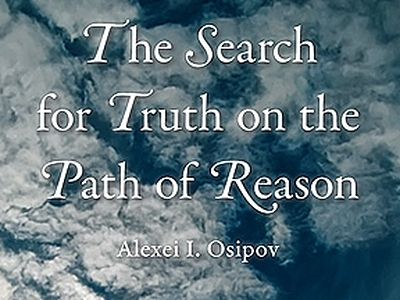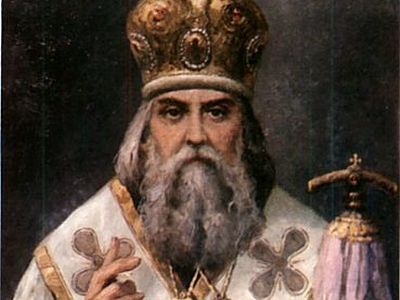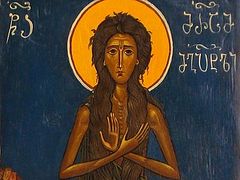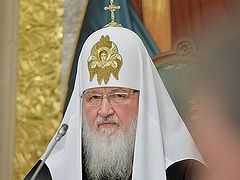From the book, The Search for Truth on the Path to Reason, by Professor Alexei I. Osipov
 Destruction by Soviet regime of the Cathedral of Christ the Savior, Moscow.
Destruction by Soviet regime of the Cathedral of Christ the Savior, Moscow. The first is the metaphysical. By freedom in this case is understood one of the most fundamental qualities of human nature—free will, expressed first of all by a person’s moral self-determination in the face of good and evil. Free will is such an important quality that, when it is lost, the personality becomes completely degraded. But as long as self-awareness is preserved, no one can take authority over this freedom—not another man, nor society, nor laws, nor any regime, nor demons, nor angels, nor even God Himself. Saint Macarius of Egypt (fourth century) said:
You are created in the image and likeness of God; therefore just as God is free and creates what He wants … so are you free.[1] Therefore, our nature is well capable of accepting both good and evil; both God’s grace, and the enemy’s powers. But it cannot be forced.[2]
A classic saying of the Church Fathers, “God cannot save us without us,” excellently expresses the Christian understanding of the sense and meaning of this freedom.
The second dimension of freedom is spiritual freedom. Unlike outward freedom, it signifies man’s authority over his own egoism, his own passions, sinful feelings, desires—over his own self. This kind of freedom is only acquired through a correct spiritual life, making the believer capable of communion with God, Who alone possesses absolute spiritual authority. The saints attained to great freedom, having purified themselves of the passions.[3] Every “ordinary” person possesses relative spiritual freedom (cf. Jn 8:34). Only those who are hardened in evil, who blaspheme the Holy Spirit (cf. Mt 31–32) and have become incapable of good, have lost this freedom. Christianity sees the ideal of spiritual life in God in this way, and thereby in principle denies the possibility that some sort of absolute freedom can exist in man (“on this side of good and evil”).[4] Archpriest Sergei Bulgakov wrote, “[Man’s] freedom is relative.… It stands and falls, is conquered and surpassed on the paths of created life to its deification. Freedom is not an independent power in itself, and in itself is powerless when it opposes Divinity.”[5] Saint Isaac the Syrian says, “For there is no perfect freedom in this imperfect age.”[6]
The Apostle Paul says, Now the Lord is that Spirit: and where the Spirit of the Lord is, there is liberty (2 Cor 3:17). He calls a person who has attained spiritual freedom “new” (Eph 4:24), emphasizing by this the renewal of his mind, heart, will and body. To the contrary, he calls those who live sinfully “old” (Eph 4:22), a “slave” (Rom 6:6, 17), as one who hasn’t the strength to follow what faith, reason, and conscience tell him, and what he himself well knows to be better for him. The apostle Paul describes this state of spiritual slavery as the antithesis to true freedom in the following very expressive words: For that which I do I allow not: for what I would, that do I not; but what I hate, that do I.… For the good that I would I do not: but the evil which I would not, that I do.… But I see another law in my members, warring against the law of my mind, and bringing me into captivity to the law of sin which is in my members (Rom 7:15, 19, 23).
The difference between spiritual freedom and freedom of will was expressed well by Kant: “By freedom in the cosmological (metaphysical —A. O.) sense I mean the ability to have an ontological state according to one’s own will. Freedom in the practical (moral, spiritual —A. O.) sense is the will’s independence from the force of sensuality.”[7]
The third aspect is social freedom. It indicates the sum of specific personal rights in a state or society. Most of the difficult questions arise in this realm, inasmuch as in society a multitude of different individuals come into mutual contact, all having their own free will. As a whole, this is the problem of man’s external freedom, or the problem of allowable (by law, custom, religion, generally accepted morals) acts in the outside world.
These three dimensions of freedom enable us to speak with complete specificity about which freedom should be the foremost goal in the Christian’s life. It goes without saying that this should be spiritual freedom, which, as was already stated, is acquired only through the process of a righteous life. What sort of life this is, what laws exist in it, by what criteria we can judge the correctness or faultiness of a chosen path, and finally, what steps a man must take in it to achieve such freedom—these are all important questions which require special attention (see Chapter 6, Old Testament Religion).
In other dimensions we should speak of freedom of the Church. The Church is both Divine and human. By force of its dual nature it possesses two different freedoms which are incommensurable with each other.
The Church, as an invisible oneness in the Holy Spirit of all those who love Christ (He that hath my commandments, and keepeth them, he it is that loveth me [Jn 14:21]) is always free, for where the Spirit of the Lord is, there is freedom. It is higher than all external freedoms, rights, and privileges. It does not fear any human limitations and repressions, and persecutions themselves only serve to glorify it the more. So it was during Jesus Christ’s earthly life and that of the Apostles, so it remains after His Resurrection and Ascension, and up to the present day—Jesus Christ the same yesterday, and to day, and for ever (Heb 13:8).
The visible Church/community, like any societal and religious organization, needs corresponding conditions for its existence, including religious freedoms regulated by the state.
Religious freedom is the right to openly confess and practice one’s religious convictions individually as well as collectively—that is, the right to perform one’s religious rites, to preach, have one’s own publishing houses, to participate in the educational process, etc. In this regard, religious freedom is no different from those highly important social or external freedoms and rights possessed by various secular organizations, and by all citizens of one or another country.
What value can we place upon these freedoms in and of themselves?
They are obviously needed for the continuation of normal life in society and its members. Nevertheless, as soon as this question touches the actual practice of these freedoms, they immediately become one of the most serious problems of social life, especially at the present time. The main reasons for this are as follows:
First. Every right has two sides, and can be used by people not only for the benefit of society and its citizens, but also for certain self-interests, even viciously (for example, not only to inform, but also to defame; not only to preach peace, temperance, chastity, but also to spread propaganda of violence, pornography, etc.). The laws which are called upon to regulate the mechanism of these freedoms are as a rule imperfect, as the reality of our modern life quite eloquently testifies.
Second. All of these rights in and of themselves do not orient man towards the most important thing—the acquisition of spiritual freedom. More than that, the catastrophic moral degradation of society and obvious decline in spirituality even in Christian churches of the “free” countries show that external freedom without the One Who restrains (cf. 2 Thes 2:7) not only does not raise a person’s dignity, but often even serves as one of the most effective means to spiritually and morally corrupt and demean him.
This slippery two-sidedness of external freedoms shows that these freedoms cannot be considered as the primary, unconditional, and self-sufficient value that liberal propaganda so energetically insists they are.
The same conclusion proceeds from the Christian understanding of man and the meaning of his life. Christian anthropology is founded upon two conditions equally unacceptable to the humanistic consciousness: 1) the “assigned” Godlike greatness of man (cf. Gen 1:26; 5:1); and 2) his “given” deeply corrupted nature, which required the sufferings of Christ Himself in order to “resurrect his image before the fall.”[8]
Real man is spiritually inadequate, sick, and corrupted by the action of a great variety of passions which deform his soul and activity. External freedom is completely unrelated to this condition of man, and not oriented toward his spiritual correction and development, or to the acquisition of what should be the highest goal of all societal establishments—the raising of every individual to the level of human dignity (cf. Eph 2:15).
Saint Ignatius (Brianchaninov) wrote:
As long as mankind is subject to the influence of sin and the passions, rule and submission are necessary. They will inevitably exist throughout the course of the life of the world; only they may appear, do appear, and will appear in various forms.… Neither equality, nor complete freedom, nor earthly welfare to the degree that ecstatic false teachers wish it and promise it, can ever be.… The relationship of rule and submission will perish when the world perishes—then will rule and submission cease (cf. 1 Cor 15:24); then will there be brotherhood, equality, and freedom; then will the reason for unity, rule, and submission be not fear, but love.[9]
This reasoning enables us to understand the fundamental Christian position as it relates to social, political, economic, and other freedoms. It consists in the assertion that all these freedoms cannot be considered to be primary guarantees for normal human life, as unconditional requirements, and especially not as aims in themselves, but only as possible means, or conditions for attaining the meaning of human life. Society’s most important task should be the establishment of a moral and lawful atmosphere in which external freedoms are an aide to man’s spiritual growth and healing, and not an atmosphere which robs him of his essence, stimulates the passions, and kills the soul itself.[10]
What is needed for this?
In the Orthodox world view, the answer to this question can be found in this basic revelation: And we have known and believed the love that God hath to us. God is love; and he that dwelleth in love dwelleth in God, and God in him (1 Jn 4:16). From this it would necessarily follow that love should be the essence of any of man’s activities.[11] The Christian understanding of love is expressed by the Apostle Paul: Charity [love] suffereth long, and is kind; charity envieth not; charity vaunteth not itself, is not puffed up, doth not behave itself unseemly, seeketh not her own, is not easily provoked, thinketh no evil; Rejoiceth not in iniquity, but rejoiceth in the truth; Beareth all things, believeth all things, hopeth all things, endureth all things (1 Cor 13:4–7).
Therefore, the basic Christian criterion necessary to appreciate freedom is the fear that comes from love; for love is afraid of causing any sort of moral, psychological, physical, or other harm to a person (society, or state). It is the truest guardian and correct relationship to things, to nature, or to any kind of activity. Saint Barsanuphius the Great said, “Freedom is good when it is joined to the fear of God.[12] This is the Christian maxim, in the light of which all of man’s freedoms, rights, and obligations, including religious freedoms, can be correctly understood.
When freedom that is not “limited” by the love of the fear of God is set to rule over love, it becomes murderous to man. It leads to the most negative consequences:[13] first of all, to spiritual and moral degradation of society, to ideological anarchism, materialism, anti-culture, and so on. Wherever freedom has been placed at the head without love, there can be no authentic freedom of the individual, for Whosoever committeth sin is the servant of sin (Jn 8:34). Slavery of spirit is the worst slavery a man can be under, for it brings him the greatest suffering. A. Solzhenitsyn once noted, “We have become fascinated with ideas of freedom, but we have forgotten that the wisest measure of freedom is far-seeing self-limitation.” Even the pagan philosophers understood this.[14]
Isn’t this the reason that the Apostle Paul wrote, All things are lawful for me, but all things are not expedient: all things are lawful for me, but all things edify not (1 Cor 10:23)?
However, any understanding about the need for spiritual freedom and its primary nature for man has been all but lost to mankind. The Apostle Peter, in rebuking the preachers for having outward freedom while “forgetting” about inner freedom, wrote, For when they speak great swelling words of vanity, they allure through the lusts of the flesh, through much wantonness, those that were clean escaped from them who live in error. While they promise them liberty, they themselves are the servants of corruption: for of whom a man is overcome, of the same is he brought in bondage (2 Pet 2:18–19). The same meaning is expressed by the Apostle Paul in his Epistle to the Galatians: For, brethren, ye have been called unto liberty; only use not liberty for an occasion to the flesh, but by love serve one another.… This I say then, Walk in the Spirit, and ye shall not fulfill the lust of the flesh. For the flesh lusteth against the Spirit, and the Spirit against the flesh (Gal 5:13, 16–17). Further on he names the “lusts of the flesh,” and concludes quite clearly, Be not deceived; God is not mocked: for whatsoever a man soweth, that shall he also reap. For he that soweth to his flesh shall of the flesh reap corruption; but he that soweth to the Spirit shall of the Spirit reap life everlasting (Gal 6:7–8).
Unfortunately, the actual powers that be in the modern world, which determine (first of all through the media) the character of modern man’s education and conditioning, decisively deny the very idea of spiritual freedom, and sow only freedom of the flesh. What this is leading to is clear to all. Freedom of speech, the press, etc., that is not in submission to the idea of love for man is for the most part in captivity to vice, “the golden calf,” and other idols, and easily becomes an instrument for lies, the propaganda of licentiousness, violence, satanism, etc.; that is, it becomes a legal instrument of evil.
A fundamental question arises: Can these freedoms be classified as Good and be called Freedom in order to secure a right to exist in normal human society? Isn’t it obvious that rights are called freedoms precisely because they are meant to free man from all forms of inner and outward evil, to constructively form and spiritually perfect him, and not to corrupt him spiritually and physically?
What, for example, does the modern freedom of television information do? It has become, according to one popular newspaper’s accurate expression, “a television plague of violence.” One American psychologist described television in his own country like this: “When you turn on the television, you automatically turn off your inner process of becoming human.” Truly, if by the age of eighteen, a young man has, according to statistical data in the U.S., witnessed 150,000 acts of violence, around 25,000 of which were murders, then what sort of freedom can we call this? This substitution for spiritual freedom by the freedom for the basest lusts is a deadly threat not only in the spiritual sense, but also in the physical sense, like a sword of Damocles hanging over mankind. For, the passions are insatiable, and the more they are indulged, the more destructive and uncompromising they become. Wherever freedom is placed above love, the godlike man ends, and the man-beast, for whom there are no values other than his own self, begins.
Therefore, modern European civilization with its tender care for the preservation of bodily freedom, cultivating all of the passions including the most shameful, while at the same time destroying the safety of the soul with unbending one-track determination, is more and more obviously leading the peoples of the world to the final circle of death. In the final analysis, all modern crises have as their source this very external freedom raised to an absolute: a bodily freedom which, having lost the concept of sin, becomes an inexorable tyranny.
An event in New York in 1978 is a perfect illustration of this. At that time, the electricity was down for only three hours. Then the fruits of post-World War II “freedom” revealed themselves to the full extent: “Crowds of Americans,” said A. Solzhenitsyn, “began looting and creating havoc.…” Fr. Seraphim Rose further comments that, “Forty years ago the lights went out in New York, and nothing happened: people helped each other out, lit candles, and so forth. And now instead they go and break windows, loot, take everything they can get for themselves, kill people, and get away with whatever they think is possible.”[15]
The ruling principle in the modern civilized world is “freedom for freedom’s sake”; that is, a basic primacy of freedom over love turns out to be a strong narcotic for man, which itself kills and is used to kill an increasing number of people. The whole collection of rights that a young person receives simply because he was born, lacking the corresponding upbringing that would enable him to attain moral maturity and steadfastness, could become the cause for the unchecked growth in him of elemental, instinctive forces, with all the negative consequences flowing from this. Isn’t it about this that ancient Greek wisdom maintained, “All that is received for free is capable of corrupting”?
That is why such freedom is sold for basic comfort. One modern writer justly said about our times, “Everywhere in the world proceeds the death of freedom—political, economic, and personal.… It is easier to live without freedom. More and more people are willingly giving up their freedom in exchange for a comfortable and peaceful way of life. There is no need to make any decisions, and less responsibility.”[16]
This denial of freedom is an entirely natural outcome, for when the passions are given freedom and enslave a person from within, they make him pleasure-loving and egotistical, and thus more capable of selling his first-born dignity as an individual for the lentil pottage of ephemeral comforts and pleasures. We can now see pictures of similar transactions in all spheres of life. The Revelation of Saint John the Theologian unequivocally foretells the general, voluntary slavery to the universal deceiver and tyrant in exchange for the earthly paradise he will promise: And all that dwell upon the earth shall worship him, whose names are not written in the book of life (Rev 13:8).
In connection with this, the question of freedom for religious organizations becomes crucial.
The propaganda of freedom of the flesh is always hypocritical. The best example of this is in the U.S., a country which most heatedly demands human rights in other countries of the world while openly trampling upon these rights at home.
In 1962 common prayer was banned from public schools by a decision of the U. S. Supreme Court. Today, all manifestations of Christian faith in schools—such as having voluntary Bible studies during lunch breaks, saying grace during meals, using a rosary on a school bus, having Christian meetings after school, or even having a Bible sit atop one’s desk—can be and have been prohibited by school authorities, and court decisions have both prompted and upheld their actions.… Courtesy of the ACLU [American Civil Liberties Union], numerous displays of the Nativity that since the inception of this country were displayed openly in public parks, etc., have been banned, and cities across the country have been forced to take nativity displays down.…[17]
Such an understanding of external freedom gives us an opportunity to take a more concrete look at religious freedom as well.
The religious freedom of separate individuals does not contain anything fundamentally different in the social sense from other external freedoms. Freedom of religious communities (churches) has its own peculiarity which leads to corresponding problems.
The first of these problems arises in connection with the question of whether or not to recognize organizations as religious. This decision is based upon authoritative common research by theologians and lawmakers, and specific and precise legal criteria of the very concept of religiousness.
The second and no less relevant problem is the evaluation of the moral side of the teachings of the religious organization requesting [legal] registration, which in turn also requires a responsible acceptance of moral criteria. The grievous example of Aum Shinrikyo[18] stands out as one clear illustration of the essential need for these criteria. De facto, and in some places, de jure legalization of satanism is one more example of an open challenge against modern social reason and its concept of religious freedom.
The third and perhaps psychologically most difficult problem is the differentiation between the concepts of equal rights and freedom. This difference is most easily shown by examples.
The first example. In a democratic country all citizens are equally free, but not all have the same rights. Its president has significantly more rights that any other citizen of the country. The law itself names the reason for such unequal rights—the will of the majority, which gave him these rights that are greater in comparison with everyone else’s. In this apparently “outrageous” inequality consists one of the natural principles of democracy and freedom.
This democratic principle should be equally extended to the resolution of problems connected with the freedom of religious organizations and their equal rights in the spheres of education, upbringing, television and radio information, and so on. This very voice of the majority of the population should decide what religious community—taking into consideration equal rights—should be given more rights in comparison with others. This democratic principle (the recognition of special rights for specific religions) is actually in effect in Germany, France, Greece, and other countries (but meets with nearly insurmountable difficulties in Russia!), for it does not disrupt the principles of religious freedom.
In connection with this, it is interesting to note, for example, that Saint John of Kronstadt sharply criticized Tsar Nicholas II for granting equal rights to all religions in 1905.[19]
Holy Hieromartyr Hilarion (Troitsky) viewed the Tsar’s decision in the same way.[20]
The famous monarchist and theologian General Kireev commented upon these freeing reforms: “The Tsar does not see or understand what deep changes his laws on equal rights to faiths have wrought in our life. He confused equal rights with freedom. No one argues against freedom, but equal right to propaganda is quite another matter.”[21]
The second example. Let us imagine that a certain wealthy totalitarian sect, having legally bought out all the media of mass information in one democratic country, begins to spread massive propaganda of an idea which is antagonistic to the religious convictions of the vast majority of the people of that country. How can we look at this fact? Would it be a normal expression of religious freedom, equal rights, and democracy, or would it be, to the contrary, a testimony of crude tyranny, obvious disregard for democracy? On the one hand, it all seems to be according to law. On the other hand, an obvious and irrefutable democratic principle, majority rule, has been ignored and flouted. And the reason for this would be that that something extremely important was overlooked—the difference between freedom and equal rights. Having given the wealthy sect equal rights with the poorer church of the people, the law disregarded the peoples’ most important right—the right of the majority in deciding main constitutional issues. A similar situation, when a plutocracy (from the Greek plutos, or “wealth”), using the slogan of “freedom,” seizes power from a democracy (meaning “the rule of the people”), has become in our times not only an ordinary occurrence, but practically a law of life in the so-called “free” world.
Therefore the right of any religious organization should, obviously, be in accordance with the law to the degree of its democratic acceptance (i.e., acceptance by the majority). Only under this condition do freedom and equal rights not enter into conflict with one another in basic antagonism to that social right which is based upon love.
One of the most highly educated hierarchs of the nineteenth century, Bishop Ignatius Brianchaninov, summarized the Christian view on the question of freedom thus:
As long as mankind is subject to the influence of sin and the passions, rule and submission are necessary. They will inevitably exist throughout the course of the life of the world; only they may appear, do appear, and will appear in various forms.… Neither equality, nor complete freedom, nor earthly welfare to the degree that ecstatic false teachers wish it and promise it, can ever be.… The relationship of rule and submission will perish when the world perishes—then will rule and submission cease (cf. 1 Cor 15:24); then will there be brotherhood, equality, and freedom; then will the reason for unity, rule, and submission be not fear, but love.[22]







Thank you from all my heart for publishing this material in English.
I would like to PURCHASE ALL THE BOOKS by professor A.I. Osipov, which are translated into English.
I myself read and listen to A.I. Osipov in Russian, but English version is necessery for my two sons. We live in Ontario, Canada.
Since 1995 all my family belonged to the MORMON church. I was looking for Truth all these 22+ years and finally I found it - in professor's A.I. Osipov publications and videos.
Please let me know where can I buy these books at the email indicated.
I will be looking forward to the reply from you.
Sincerely,
Aukse Ivanov
You may find some info here: http://www.pravoslavie.ru/english/32715.htm
I really enjoyed this summary about the work of Professor Osipov.
I teach Anthropology of Religions and my interest is to study the largest Orthodox Christianity.
How could I get this book in English?
My email is: famlabriola@hotmail.com
I appreciate your attention.
Francisco
Deep and simple.
True.
Inspiring.